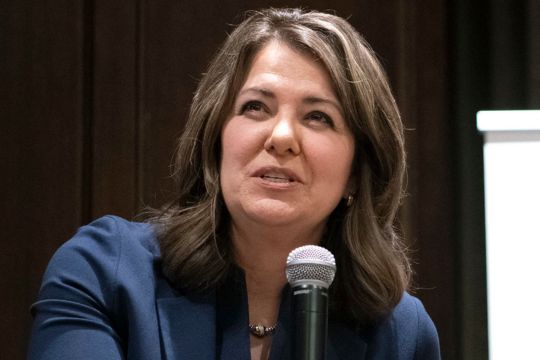
Premier Danielle Smith’s United Conservative Party has narrowly pulled of a majority government but will have to work hard to win over the province’s big cities. (Photo credit: Chris Schwarz/Government of Alberta)
On May 1, 2023, the writ dropped for the Alberta provincial election — pitting Rachel Notley’s New Democratic Party (NDP) and Danielle Smith’s United Conservative Party (UCP). Smoke engulfed the province as wildfires burned, leading to a state of emergency — and a pause in the campaign.
When campaigning resumed, Smith’s scandal-plagued government was under heavy pressure with polls revealing the race was neck in neck for most of the campaign. Ultimately, Smith’s UCP pulled off the win. Despite losing 15 seats, the UCP gained a majority government with 48 seats to the NDP’s 38. This is the narrowest majority government in the history of Alberta, which will put even more pressure on Smith. Her supporters remain deeply divided with many traditionally conservative voters feeling left behind as the party has leaned further right under her leadership.
The results also cemented Alberta as a two-party province — one that is deeply polarized along urban and rural lines. While the UCP took nearly every rural seat in the province, the NDP swept Edmonton and stole most of the seats in Calgary. What’s more, no registered party aside from the NDP and UCP brought in a single percentage point of the vote.
Premier Smith will have to work hard to win over those in Alberta’s big cities. The Edmonton Journal described the election results as “the worst-case scenario for Edmonton”, saying that “it’s not inconceivable that [the UCP] will push hard for policies that will come into direct conflict with the values of most Edmontonians […] nor would it be a shock to see a provincial pension plan and other separatist-minded policies make an appearance.”
Prior to the campaign, the UCP had been investigating the possibility of pulling Alberta out of the Canada Pension Plan. Smith did not campaign on the promise of an Alberta-only plan but said the idea could be revisited post-election.
In response, Federal Retirees CEO Anthony Pizzino penned an op-ed that appeared in the Globe and Mail. Pizzino begins by pointing out that a mere 21 percent of Albertans feel the provinces should withdraw from the Canada Pension Plan, adding that the CPP continues to be well-funded and has always securely paid benefits. Reports from the Office of the Chief Actuary of Canada (OCA) have consistently indicated that the Canada Pension Plan (CPP) is sustainable over a 75-year projection period, and the plan is protected from dangerous political interference in investments that can hurt the plan’s ability to pay pensions.
“A provincial plan would dilute and weaken the CPP and would make the pensions of our Alberta-based members and future members more risky and less sustainable,” says Pizzino. “Establishing a pension plan for Alberta is a lot riskier for all concerned than staying with a plan that’s been working for 57 years and is projected to work for at least 75 more."
The Association is urging Smith to abandon any plans to push Alberta to leave the CPP.

